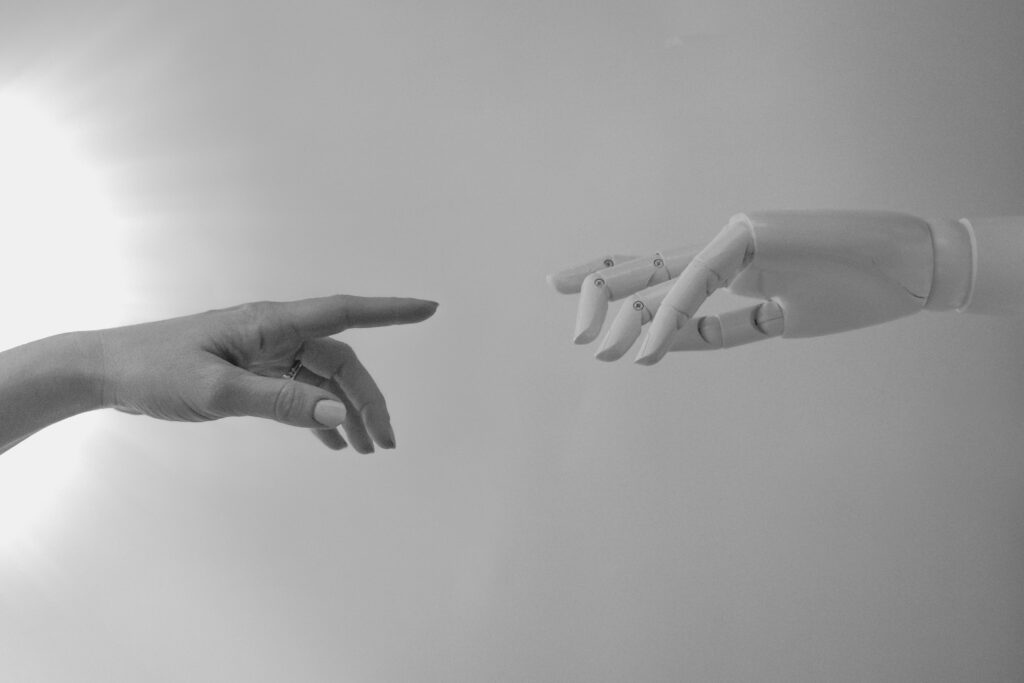
Photo by Tara Winstead, pixel
Do you feel like robots are coming to take your job? It doesn’t have to be this way. One thing has always set us apart: our humanity.
If you’re like most people, you probably think that artificial intelligence (AI), or automation, has the potential to have a major impact on the global job market.However investigation shows that most of us think these disruptive technologies will primarily affect other people—people with the right skills or educational background to do repetitive work. This is a risky assumption. Automation technology is developing and improving every day.
It’s a fact: Not only are robots coming — they have arrived. But that doesn’t mean we’re all out of a job.This means we need to explore opportunities The future of human workto complement or even enhance artificial intelligence, automation and productivity.
So, what is automation technology and how can we underpin the future of work? Can we work with automation so that it affects our jobs in a positive way?
Let’s take a deeper look at how automation and technology will impact jobs in the long term.
What is automation technology?
In short, automation technology lets machines do work with minimal human input. Automation shortens lead times and addresses unique needs and goals—without your involvement. Sounds like a robot is taking your job, right?
That’s why we’ve brought in the award-winning New York Times tech columnist Kevin Ross Discuss the impact that automation may have on our livelihoods. Artificial intelligence and automation are already changing the way we work, Roose said. So how will these technologies shape the future of our work?
During research for his book, “Facing the Future: 9 Rules for Being Human in the Age of Automation“Roose found that we’ve been predicting for hundreds of years what machines can and can’t do — and we’ve generally been wrong, on balance.
These quotes really stand out:
- “I can say flatly that a heavier-than-air flying machine is impossible.” — Lord Kelvin1895
- “The use of electronic digital computers in the field of translation will not bring about any revolutionary changes.” — Yehoshua Bar-Hillel1962
- “You’re not going to get the best seat or the best fare… what if you hit the wrong button?” —Travel Agency Owner Automated Ticketing, New York Times1984
Disruptive technologies that will prove these predictions wrong will forever reshape the economy and the workforce. At the time, however, each statement reflected widely held beliefs.
For example, in the 1950s, people used Tools like Rolodexes Manage their new leads. Unable to find out more information about the lead or share it with the team. Today, with the development of powerful, automated CRMs, sales and support agents are working together to create a seamless customer experience with every new lead.
The changing landscape of automated information technology is shaping many jobs outside of sales.
How are automation and technology affecting jobs?
You might still think of robots on the assembly line as the quintessential agent of job displacement, but artificial intelligence is making progress in areas that many never thought were vulnerable to automation. Here are just a few:
- health care: Machine learning algorithms can diagnose certain cancers or perform X-rays more accurately than human radiologists. Other AI applications at work can detect diseases ranging from cancer to Parkinson’s by simply smelling a person’s breath.
- Creative: AI can compose music, write prose, build video game levels, and write all kinds of content on the web.
- software: With automation, anyone can learn how to code. Low-code or no-code development platforms remove the complexities of writing computer programs.
- data analysis: Artificial intelligence and machine learning analyze data sets to identify patterns and trends. With advances in automated information, they can report real-time insights and in some cases predict what might happen next.
- social influencer: Some of the biggest social media influencers aren’t human — they’re AI-designed models.
- application development: Given AI’s ability to process large datasets quickly, it enables the creation of artificial intelligence applications, Artificial Intelligence Beyond Human Creation.
- Speech Recognition: Whether it’s adding items to your shopping list or generating meeting notes over a Zoom call, AI applications can capture and process what they hear more accurately than many humans.
When Roose was writing about advances in AI, he began to worry about his fungibility as a reporter. He embarked on a path of research on how to avoid being replaced by robots, and how to future-proof our profession while still using automation.
How to future-proof your career (and still embrace automation)
What can we do to protect our jobs from AI and robots?
There is good news and bad news. First, the bad news. Almost every job that exists today can be automated to some extent. Honestly, there aren’t any technically sound jobs or career paths in the long run.
good news? Human creativity and determination are at an all-time high. And it’s not limited to any job or role. By simply embracing your humanity (something a robot will never be able to), you have the power to connect with your career, your team, and the future at scale.
Now is not the time to panic—this is the time to build roles and capabilities that can be automated to provide new value at every level.
As AI lowers the price of goods and automated services, it also increases the value of human goods and human experiences. It rewards those who are good at working with machines to create these new things.
With that in mind, there’s one major thing you can do to make your work more forward-looking, whatever it may be: Don’t be so sarcastic, just be human.
The best way to differentiate yourself is through your humanity and creativity, not your productivity. Emphasize the uniqueness of the human labor you do or make—whether making ceramic bowls, providing customer service, or selling technical products. How you are present, aware and ready to participate at any given moment – this is your human differentiator.
Go beyond using AI and automation to work as fast, at scale, and as efficiently as possible. Make that human touch more visible and more valuable. This is what the human economy is about: experiences and feelings that machines cannot replicate.
Relationships are especially important in customer service. Our research shows that 76% of customers expect companies to understand their unique needs, yet only 34% of customers feel companies truly treat them as individuals.
“Any company that doesn’t invest in this space is putting its entire business at risk,” said Lidiane Jones, executive vice president and general manager of Salesforce Digital Experiences. tell forbesBusinesses can deliver personalized, connected experiences to customers by combining artificial intelligence with powerful service and marketing innovations, she added.
All experiences are personal. That’s what makes them special. They involve humans, and indeed, it is humans combined with meaningful experiences that we will seek out and pay for.
To move beyond bots, we encourage you to adopt automation techniques that help your team grow. If you’re interested in learning how automation can help advance your career, learn more about how we’re bringing a human touch to our workflows.

original post, sales force

